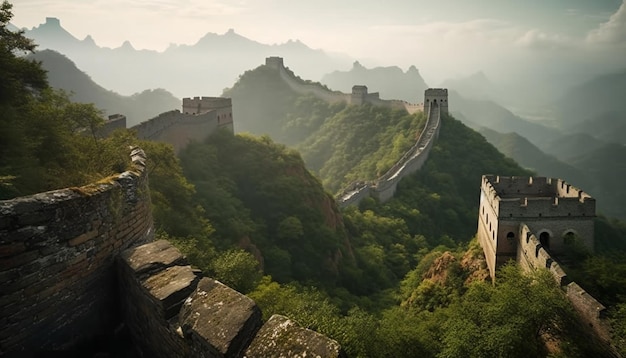10 Fascinating Facts about the Great Wall of China

The Great Wall of China is the longest man-made structure in the world, measuring over 21,000 miles.
Construction of the wall began over 2,000 years ago, during the Qin Dynasty.
It is estimated that over 1 million workers died during the construction of the Great Wall.
The Great Wall served as a defense system, protecting China from invasions by nomadic tribes.
It is believed that the Great Wall can be seen from space, but this is actually a myth.
The wall was not a continuous structure, but rather a series of walls, watchtowers, and fortresses.
Due to its immense length, the wall contains various terrain features, including mountains, valleys, and deserts.
The Great Wall is a UNESCO World Heritage site and a popular tourist destination.
There are several sections of the Great Wall that are easily accessible, such as Badaling and Mutianyu.
The wall was constructed using a variety of materials, including brick, wood, and stone.
The Great Wall was built using a special mortar made from rice flour.
The wall was not completely impenetrable, as it had various gates and checkpoints for trade and movement.
The Great Wall was not only a military defense, but also a symbol of Chinese unity and culture.
Some sections of the wall have been restored and renovated to ensure their longevity.
The Great Wall has been depicted in numerous works of art, literature, and film.
The wall is visited by millions of tourists every year, making it one of the most popular landmarks in the world.
10 Fascinating Facts about the Great Wall of China part 2
The Great Wall is also home to unique flora and fauna, including rare plant species and migratory birds.
The wall has influenced various architectural styles and construction techniques in China.
During the Ming Dynasty, the Great Wall served as a communication and transportation route.
The wall’s purpose expanded beyond defense, with sections used for border control, customs, and even as a signal station.
The Great Wall showcases the impressive engineering skills of ancient Chinese civilizations.
The wall’s construction involved intricate planning, including surveys, road building, and signal systems.
Some sections of the Great Wall are accessible for hiking and provide stunning views of the surrounding landscapes.
There are legends and myths associated with the Great Wall, including stories of ghost soldiers and lost treasures.
The Great Wall was not only built to keep invaders out, but also to prevent Chinese people from leaving.
The construction of the wall required an enormous workforce, including soldiers, peasants, and prisoners.
The Great Wall has been a source of national pride for China, representing its rich history and cultural heritage.
The wall has been damaged over time due to natural disasters, wars, and erosion.
Conservation efforts are ongoing to preserve and protect the Great Wall for future generations.
The Great Wall has been featured in famous films like Mulan and The Great Wall.
The wall has inspired various awe-inspiring sculptures, paintings, and photographs.
Sections of the Great Wall can be explored by bike, offering a unique perspective and adventure.
Some parts of the wall are illuminated at night, creating a captivating and magical sight.
The Great Wall has become a symbol of endurance, strength, and determination throughout history.
The Great Wall offers tourists the opportunity to immerse themselves in ancient Chinese culture and traditions.
The wall served as a hub for trade routes, connecting regions and fostering cultural exchange.
The construction of the Great Wall took centuries to complete, with different dynasties contributing to its expansion.
The Great Wall has been called a stone dragon, winding its way through the Chinese countryside.
The wall has witnessed countless battles, both fought on its grounds and to protect its structure.
The Great Wall is a testament to human ingenuity and the ability to undertake monumental projects.
The wall has inspired poets, writers, and musicians, leading to the creation of numerous artistic works.
Great Wall marathons are held annually, attracting runners from around the world to experience its grandeur.
The wall has become a popular symbol of China, appearing on its currency and postage stamps.
The Great Wall has been recognized internationally as a cultural icon and a symbol of global heritage.
The Great Wall stands as a reminder of China’s past, showcasing the achievements and advancements of ancient civilizations.

